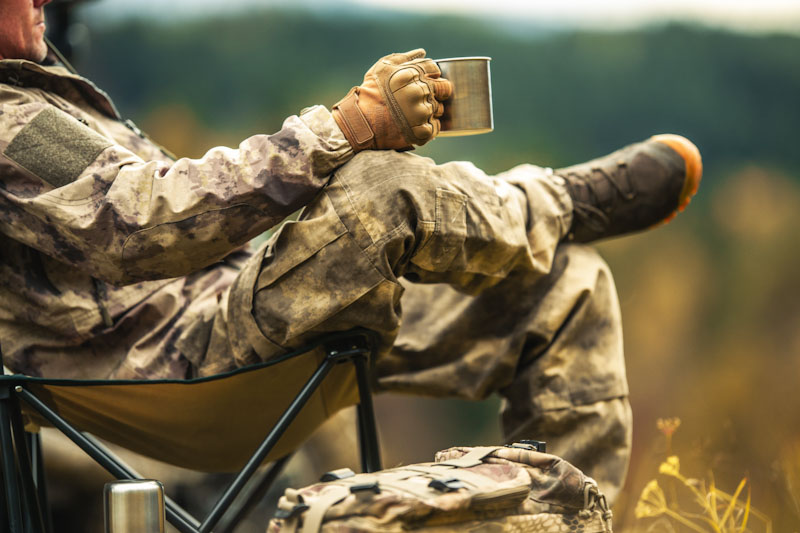More and more people have adopted the “emergency preparedness” lifestyle with the arrival and passing of the COVID pandemic. They eventually acknowledged that we live in uncertain times where everything is possible, and our survival is constantly being put to the test.
There are many different survival scenarios people are preparing for, and while most of them have mastered the art of stockpiling food, water, and other resources needed for their survival, one aspect is highly overlooked, how to combat boredom.
Most folks out there don’t have a bug-out scenario planned, and unless the disaster forces them to evacuate, they will all stay home and try to hold down the fort. In fact, hunkering down seems to be the preferred scenario for most preppers, and it’s also the most convenient one due to obvious reasons. You have everything at home, you know it by memory, and you are willing to put your life on the line to defend it.
However, how about those times when there’s no danger, and you just need to wait things out for weeks or months? What will you do with all that “free time”?
Those of us, being part of large families, know that it doesn’t take much for the kids to go up the walls or the old folks to become grumpy when there’s too much free time on their hands with nothing to be filled. If the power goes out during a blizzard and you suddenly have to rely on conversation to entertain both young and old for hours, I guarantee that boredom will set in faster than you expect.
And the problem with boredom is not that it can become an annoyance over short periods of time, but it can also lead to other issues, such as an excess of nervous energy that needs to be released. Others, on the contrary, may become tired and lethargic, and interacting with them will become problematic as time goes by.
You can imagine that none of these scenarios would be pleasant during a crisis, and sooner or later, you will need to figure out ways to keep both the young and the old entertained. Let’s look at the options available to all of us to keep boredom away when we hunker down.
Gaming or games?
Gaming has gained a lot of popularity in the last two decades and is present everywhere with the development of various mobile phones and hand-handled game consoles. Kids stay glued to their phones 24/7, and if they’re not on social media, they are most probably playing a game with their friends. The problem with digital games is that you need the power to run them and, oftentimes, an internet connection to be able and play them. During an extended blackout providing power for game consoles and other similar devices may not be a priority, and your kids will surely be disappointed.
To satisfy their gaming appetite, your best bet would be to dust off the old board games and once again use them to “unite or divide” your family (monopoly players know what I’m talking about). Board games will always remain a viable option to entertain people of all ages, and these tried-and-true alternatives can keep your kids busy for hours. When relying on board games to entertain your family members, your only concern is to make sure all the pieces are there since you don’t want to find out later in the game that something is missing.
Almost every family in the United States has a few dusty boxes of board games, and they will prove valuable resources in your fight against boredom. Even if you lack certain popular games, you can always find them at affordable prices at local thrift stores (once again, make sure all the pieces are there).
To make sure your board games night is not ruined, think about including an extra pair of dice or two since these always seem to go missing. There are many games you can just play with just the dice, and Yahtzee is the most popular one.
Playing cards are also an option, and there are various books on the market teaching you several games and the strategy to play these games with just a deck of cards. And speaking of playing cards, how about something different like Cards Against Humanity? This can be a lot of fun for the grown-ups and will produce a lot of laughter.
Besides the options listed above, you can play various memory games using whatever resources you have at hand. For example, you can use playing cards to invent a match-two game. Just pick a few pairs of two-of-a-kind cards, mix them up, and place each card facing down in a row of 4-6 cards (depending on how many pairs you picked). The player needs to flip one card at a time, and if he or she flips two consecutive cards forming a pair, those cards are removed. If the cards are different, they are flipped back, and he/she tries again until there are no cards left unturned.
Another idea for a memory game would be to ask the members of your family to map your neighborhood from memory. Every person gets a blank piece of paper and a pen, and they have 10 minutes to draw their neighborhood. Once the time runs up, you can show each map and compare them; the most accurate reproduction of the neighborhood layout wins.
Music
Listening to music is another favorite pastime of people, and both the young and the old love music. The problem with listening to music for an extended period of time is that you need the power to operate the devices playing the music (although this is becoming less of a problem with the invention of various wireless devices with batteries lasting up to 10 hours or more) and some people have a peculiar taste in music.
For example, young children have certain favorite songs they play on repeat for hours, and you can imagine how annoying this can become for others if they use the home’s wireless speaker. Having a device holding a music library for each member of the family and a pair of headphones may be the best option in such cases, and everyone will be happy with their music choices.
Reading
Many people out there are still avid readers, and the same goes for preppers and survivalists. I personally have a large library, in both digital and paper format, and I wish I had enough free time to read all the books I have gathered over the years. But if there’s a crisis with enough downtime after the event has passed, I believe it would be the perfect opportunity for me to catch up on the books I have.
The same probably goes for a lot of people out there, regardless if they are preppers or not, and every free time is filled with a good book. Even with digital media, a lot of us still prefer the feeling of paper between our fingers, and we value our “old-school” library. For those more adapted to the current times, a Kindle or iPad is the preferred way to go, and as long as you have the means to power such devices, your thirst for knowledge and entertainment will be satisfied.
For the younger members of your family, but also for the older ones, there are now various books with coloring activities and various puzzles. In order to progress through the story, you have to color some missing parts or solve certain puzzles. There are even interactive books where you have pages with various information, and on certain sections, you can use an interactive pen to discover more about the story at hand.
Building or repairing stuff
When facing periods of downtime, one effective way to combat boredom and maintain a sense of purpose is by engaging in building or repairing tasks. These activities not only keep the mind occupied but also contribute to the overall functionality and well-being of the survival situation.
The best part about building and repairing stuff as a way to combat boredom is that you can also include others in your projects. You will gain a helping hand, and they will learn new stuff by seeing and doing.
Here are a few examples of building and repair tasks that can be undertaken during such situations:
- Shelter improvements: Use the available materials to fortify and improve the existing shelter. This can involve reinforcing walls, insulating the structure, or creating additional storage space. Repair any leaks or damages to maintain a safe and comfortable living environment.
- Firewood storage: Construct a firewood storage area or rack to keep the firewood dry and easily accessible. This can involve gathering branches or logs and arranging them in a sturdy and organized manner.
- Tool crafting: Utilize natural resources to craft or repair essential tools. For example, fashioning a wooden handle for a broken axe or creating fishing spears from sturdy branches can prove invaluable for securing food or completing other survival tasks.
- Water collection System: Build a rainwater collection system using available containers, tarpaulins, or improvised gutters. This helps ensure a steady supply of clean water for drinking, cooking, and hygiene purposes.
- Fixing hunting and fishing tools: Craft or repair hunting and fishing tools like traps, snares, nets, or fishing lines. These can significantly increase your chances of procuring food during a prolonged survival situation.
- Repairing gear: Inspect and repair any damaged gear or equipment. This includes sewing torn clothing or mending backpacks, tents, or footwear. By ensuring that your equipment is functional, you enhance your ability to navigate, endure harsh conditions, and perform essential tasks.
Working out
Engaging in physical activity serves as an excellent channel to release surplus energy and utilize free time while simultaneously aiding in achieving or maintaining physical fitness. When confined to a limited space during a “bug-in” scenario, where you need to remain indoors for an extended period, there are still various exercises and activities that can help combat boredom and keep you physically active.
Here are some ideas suitable for both young and old individuals:
- Stretching and Mobility exercises: Dedicate time to stretching exercises that help improve flexibility and reduce muscle stiffness. Focus on areas susceptible to tightness, such as the neck, shoulders, back, and legs. Gentle mobility exercises, such as wrist rotations and ankle circles, can also be beneficial.
- Chair exercises: Perform seated exercises that focus on different muscle groups. Examples include seated leg lifts, chair squats, seated push-ups using the edge of a sturdy chair, and arm circles. These exercises can help maintain strength and flexibility.
- Yoga or Pilates: Follow along with instructional videos or use a mobile app to practice yoga or Pilates exercises that are designed for small spaces. These activities promote flexibility, balance, and core strength.
- Stair climbing: If you have access to a staircase, utilize it for a cardio workout. Walk or jog up and down the stairs, gradually increasing the intensity and duration as your fitness allows.
And just to mix things up, you can always count on target practice
Target practice using Nerf guns or laser guns can be a fun and safe activity, particularly for young individuals, as they provide an introduction to the concept of aiming and accuracy. These toy guns offer a controlled and low-impact environment for practicing hand-eye coordination and focus. As young individuals gain experience and demonstrate responsible behavior, they may progress to using air guns under proper adult supervision.
Engaging in target practice with air guns, such as pellet guns or BB guns, can be an opportunity for young individuals to further develop their marksmanship skills. However, it is crucial to prioritize safety and follow appropriate guidelines.
Here are some things to keep in mind when progressing to air guns:
Always ensure responsible adult supervision during target practice sessions. An experienced adult can provide guidance on safety protocols and proper handling of air guns and reinforce responsible behavior.
Set up a designated and secure shooting range in a controlled environment. Make sure the area is clear of any potential hazards or obstructions and is suitable for the type of air gun being used.
Prioritize safety by wearing the right gear, such as safety glasses or goggles, to protect the eyes. In some cases, you should also encourage the use of ear protection if shooting in an enclosed space.
Emphasize the importance of having a clear and appropriate target, as well as a safe backstop to capture any projectiles. Avoid shooting at live animals, people, or any unintended targets.
Concluding
Combating boredom during a downtime survival scenario is crucial for maintaining mental well-being and a sense of purpose. Engaging in various activities, such as building or repairing tasks, physical exercises, and mental stimulation, whether it is achieved through the use of games, books, or other items, can significantly alleviate boredom while contributing to overall survival and resilience.











TruthB Told | July 2, 2023
|
What about “hanky panky” (if you have a willing partner?
Anita | July 2, 2023
|
Hanky panky is good for the old folks too.
In fact, I am offended by this author’s assertion that old folks should be included with the toddlers and very young as people who are easily bored . Even if we are bored, we are not going to act like toddlers and cause problems for the “real “ people.
JERRY D BRADBERRY | November 2, 2023
|
WE AMERTCANS HAVE BECOME WEAK TOO MUCH GOOD FOOD THAT WE DON’T NEED FOOD THAT WILL PUT THEPOUNDS ON YOU 80 TO 90 PERCENT OFUS DON’T HAVE A JOB THAT MAKES YOU DO HARD WORK DAY AFTER DAY I LOST MY WIFE IN DCE,82 58 YEARS SHOT TO HELL I HOLD EVERYBODY THAT WORK ON OR PUSHED THE SHOTS 6 MONTHS AFTER THE SECOND SHOT MY WIFEW EAS DEAD MAY YOU ALL ROT IN HELLFOT 2 MONTH ALL I DID WAS FEED MY SELF OUT DOGS AND CHICKENS THISYEAR I PUT OUT A GARDEN WITH MY DAUGHTS HELP YES I KNOW WHAT I AM DOING I CAN AND WILL HERE UNTIL I GO TO BE WITH HER UNTIL THEN GET BACK TO WORK TO DO FOR YOUT FAMILY
Leam | December 13, 2023
|
If you’re “bored” during SHTF, you’re lazy and doing it wrong. Everyone should be planting, harvesting, watering, feeding livestock, gathering wood, cleaning, sentry duty, cooking, etc. WORKING, not sitting!